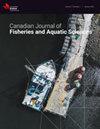On Increasing Equity and Inclusion of Early-Career Professionals for Conferences and Conference Networking in Canadian Fisheries and Aquatic Science Societies
IF 1.9
2区 农林科学
Q2 FISHERIES
Canadian Journal of Fisheries and Aquatic Sciences
Pub Date : 2024-07-18
DOI:10.1139/cjfas-2024-0033
引用次数: 0
Abstract
As early-career professionals (ECPs) navigate their education and professional development in the aquatic sciences, many seek to build a network to help guide their entrance into the field. Scientific societies play a vital role through hosted conferences, where ECPs can meet and share ideas with others and find mentors. However, not all ECPs are the same, and those from marginalized backgrounds face unique challenges. Here, we provide a perspective on ways scientific societies can ensure all members are provided with equitable opportunity to discover, access, and build career-defining networks at conference events, including the critical role of mentors in navigating obstacles to success. Our recommendations originate from an early-career networking workshop in 2022 at a Canadian fisheries and aquatic sciences conference. The day-long hybrid event comprised interactive activities and discussions on how societies and their conferences can foster and promote inclusive networking for all, including online attendees. This perspective serves as a call to action for scientific societies and senior-career professionals to meaningfully engage with early-career professionals and marginalized members to promote transformative science.提高加拿大渔业和水产科学协会会议和会议网络对早期职业专业人员的公平性和包容性
随着早期职业专业人员(ECPs)在水产科学领域的教育和职业发展,许多人寻求建立一个网络,以帮助指导他们进入该领域。科学协会通过主办会议发挥着重要作用,在这些会议上,ECP可以与他人会面、分享想法并找到导师。然而,并非所有的 ECP 都是一样的,来自边缘化背景的 ECP 面临着独特的挑战。在此,我们将从科学协会的角度出发,探讨如何确保所有会员都能在会议活动中获得发现、接触和建立决定职业生涯的网络的公平机会,包括导师在克服成功障碍方面的关键作用。我们的建议源自2022年在加拿大渔业和水产科学会议上举办的早期职业网络研讨会。为期一天的混合活动包括互动活动和讨论,探讨学会及其会议如何促进和推动包括在线与会者在内的所有人建立包容性网络。这一观点呼吁科学协会和资深专业人士采取行动,与早期专业人士和边缘化成员进行有意义的接触,以促进变革性科学的发展。
本文章由计算机程序翻译,如有差异,请以英文原文为准。
求助全文
约1分钟内获得全文
求助全文
来源期刊

Canadian Journal of Fisheries and Aquatic Sciences
农林科学-海洋与淡水生物学
CiteScore
4.60
自引率
12.50%
发文量
148
审稿时长
6-16 weeks
期刊介绍:
The Canadian Journal of Fisheries and Aquatic Sciences is the primary publishing vehicle for the multidisciplinary field of aquatic sciences. It publishes perspectives (syntheses, critiques, and re-evaluations), discussions (comments and replies), articles, and rapid communications, relating to current research on -omics, cells, organisms, populations, ecosystems, or processes that affect aquatic systems. The journal seeks to amplify, modify, question, or redirect accumulated knowledge in the field of fisheries and aquatic science.
 求助内容:
求助内容: 应助结果提醒方式:
应助结果提醒方式:


